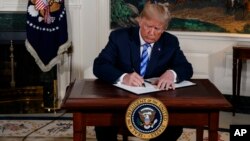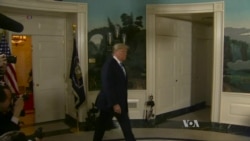French Foreign Minister Jean-Yves Le Drian said Wednesday the nuclear deal six world powers reached with Iran nearly three years ago is “not dead,” even after U.S. President Donald Trump announced his country’s withdrawal from the accord.
Speaking to RTL radio, Le Drian said French President Emmanuel Macron and Iranian President Hassan Rouhani were to speak to each other Wednesday, and that the foreign ministers of France, Britain and Germany would discuss the situation with Iranian officials Monday.
Inside Iran’s parliament, Trump’s decision was greeted with lawmakers setting fire to a piece of paper with a picture of the American flag as well as another paper representing the nuclear deal.
Parliament Speaker Ali Larijani said Iran’s nuclear department should be ready to resume all of its activities.
Allegations that Iran was working to develop nuclear arms prompted the United States, Britain, China, France, Russia and Germany to seek the 2015 agreement, which put limits on Iran meant to ensure it could not build nuclear weapons. In exchange, Iran received relief from economic sanctions.
Trump formally renounced the agreement Tuesday, decrying it as “a horrible one-sided deal that should have never, ever been made.”
WATCH: Trump Withdraws US from Iran Nuclear Deal
In remarks from the White House Diplomatic Room, the president declared that the United States is immediately reinstating all Iran-related sanctions it waived as part of the Joint Comprehensive Plan of Action (JCPOA).
Trump then signed a memorandum ordering U.S. agencies to reinstitute all nuclear sanctions on Iran that were waived by Trump’s predecessor, Barack Obama.
The JCPOA “didn’t bring calm, it didn’t bring peace, and it never will,” Trump said.
He asserted that “it is clear to me that we cannot prevent an Iran nuclear bomb” under the pact, adding “the United States will withdraw from the Iran nuclear deal” because “America will not be held hostage to nuclear blackmail.”
Trump’s decision to withdraw from the agreement comes despite pleas from several of America’s closest allies in Europe not to imperil the pact. Trump and hard-liners close to the president, such as Secretary of State Mike Pompeo and National Security Adviser John Bolton, have been fierce advocates for scrapping it.
Watch Trump's remarks:
A senior State Department official told reporters the Trump administration had made “good progress” and “got close” in efforts to reach a supplemental deal with European partners in recent months, including on the issues of ballistic missiles and regional issues. But the official said the sticking point that prevented an agreement was the so-called sunset clauses in the nuclear deal that allow certain provisions to expire after a given number of years.
Israel, believed to be the only country in the Middle East with a nuclear arsenal, has also backed Trump’s rhetoric on the JCPOA.
“Israel has opposed the nuclear deal from the start because we said that rather than blocking Iran’s path to a bomb, the deal actually paves Iran’s path to an entire arsenal of nuclear bombs,” Israeli Prime Minister Benjamin Netanyahu said after Trump’s announcement. “The deal didn’t push war further away, it actually brought it closer. The deal didn’t reduce Iran’s aggression, it dramatically increased it.”
Iranian President Rouhani said Tehran would remain committed to the multinational pact.
“I have ordered the foreign ministry to negotiate with the European countries, China and Russia in coming weeks,” Rouhani said in a televised speech following Trump’s announcement. “If at the end of this short period we conclude that we can fully benefit from the JCPOA with the cooperation of all countries, the deal would remain.”
Former President Obama, whose administration led intense negotiations to strike the agreement, called Trump’s action “misguided.”
“I believe that the decision to put the JCPOA at risk without any Iranian violation of the deal is a serious mistake,” he cautioned in a statement.
Immediately after Trump’s remarks, the U.S. Treasury Department announced “wind-down provisions” for existing contracts that European countries have with Tehran to avoid running afoul of U.S. banking regulations.
Under those provisions, after six months sanctions will be back in place related to Iran’s oil, petrochemical and shipping sectors as well as its central bank. Sanctions involving Iran’s purchase of U.S. bank notes, trade in gold or precious medals and providing Iran with aluminum or steel.
A senior White House official told reporters that new sanctions are possible “as new information comes to light.”
“And that’s something that we should pursue vigorously because we want to put as much economic pressure on Iran as we can and deny them the revenues that they would have gotten from the transactions we’re not eliminating,” the official said.
Trump’s move allows him to claim he has accomplished one of his major 2016 election campaign promises — removing the United States from the pact he repeatedly deemed “the worst deal ever.”
“People will make this all about Trump, but it is not,” James Carafano, vice president for the Heritage Foundation’s national security and foreign policy institute, told VOA. “The deal was not sustainable over time. No one was happy with it, not even the Iranians, who expected big benefits that never materialized. Trump did the equivalent of a mercy killing.”
Proponents of the JCPOA accuse Trump of misrepresenting the agreement’s clauses, contending it has successfully frozen Iran’s nuclear weapons development. They also said the deal’s demise could prompt a nuclear arms race in the region.
Trump’s announcement was made as he prepares to meet — possibly in about a month — North Korea’s leader, Kim Jong Un, to discuss a possible denuclearization agreement.
In a tweet, Jon Wolfsthal, a former top arms control official at the National Security Council during the Obama administration, and currently a nonresident scholar on nuclear policy at the Carnegie Endowment for International Peace, predicted the collapse of the JCPOA would help North Korea.
“Trump will be desperate for a nuclear win. Content of the agreement doesn’t matter — it’s about the headline,” Wolfsthal tweeted. “North Korea is going to take Trump to the cleaners. Trump will claim success. We lose.”
Carafano counters, stating that North Korea “will get the message, too. Trump won’t sign up for a weak deal.”







